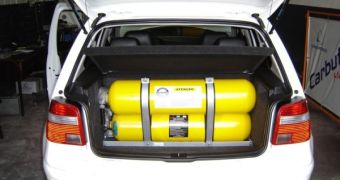The numbers of compressed natural gas (CNG)-powered cars has been slowly rising in Egypt, South America and Europe over the last few years, as people try to escape the burden of having to pay more and more money for gasoline or diesel. Plus, the gas offers a slightly cleaner alternative to fossil fuel, releasing very low amounts of greenhouse gases (GHG), associated with global warming.
In Egypt, some 100,000 cars were converted to either hybrid, or gas-only propulsion systems, although the government subsidizes the oil industry and prices are lower than on the international market. Yearly, authorities pay about one fifth of the national budget to oil companies, which in turn keep the gas prices at about 1.75 Egyptian pounds per liter ($1.45 per gallon).
But recent developments of the financial crisis prompted the government to withdraw its backing, which meant that people woke up to see that gas prices had inflated overnight, by as much as 50 to 60 percent. And this trend will likely continue, as increasing demands from state workers for higher pays force the Egyptian government to draw money from wherever possible.
After reviewing the latest statistics, high officials say that the country will move towards exploiting more green energy sources, and that more investments in renewables will be made. Hydroelectric plants are a good option, but the nation does not benefit from many suitable rivers to build the facilities on. Nuclear power plants are also a sustainable alternative, and Egypt already got US to back up its endeavors.
Other plans of reducing both pollution and its dependency on fossil fuels imply the widespread use of buses and heavy-duty vehicles, which currently consume the most oil. Plus, Egypt only has trace amounts of oil in its underground, so it might not really have another choice, except importing from its richer neighbors.

 14 DAY TRIAL //
14 DAY TRIAL //